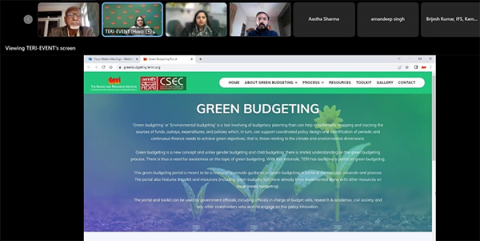Experts advocate for green budgeting as a policy nudge to promote environmental sustainability

New Delhi, December 28, 2022: Quite like the child and gender budgeting provisions in public budgets which address social objectives, experts at a National Webinar on Green Budgeting organized by The Energy and Resources Institute (TERI) in New Delhi on Wednesday, emphasized the significance of having green budgeting as ‘the third leg of the triad of nudges’ so that environmental goals can be achieved as well. TERI’s ‘Green Budgeting’ portal which aims to be a one-stop resource on aspects associated with the policy innovation was launched during the webinar.
Observing that green budgeting is an evolving concept, Dr Prodipto Ghosh, Distinguished Fellow, TERI, said, “While green budgeting is a new concept, the broader notion of trying to infuse social aspects into budgetary process is not new.”
Taking part in the webinar, Dr Ghosh dispelled a few misconceptions around green budgeting. “Green budgeting is not a scheme or a programme. It does not require additional resources or budgetary provisions. All it tries to do is ensure that the available budget is progressively more sustainable due to a stronger focus on Sustainable Development Goals (SDGs),” he added.
TERI’s ‘Green Budgeting’ portal, developed in collaboration with Asian Development Research Institute (ADRI), intends to enhance the awareness and understanding of green budgeting among stakeholders which include government officials in charge of budget cells, as well as researchers, academics and members of the civil society engaging with the policy innovation.
As a knowledge resource, the portal aims to be a holistic guide providing information on the concept, rationale and processes involved in green budgeting. It also provides a toolkit to assist stakeholders in initiating and executing a green budgeting process, and handholds them through the pro-forma and structures involved in the policy innovation.
Demystifying green budgeting for the webinar attendees which included government officials from the states of Punjab, Maharashtra, Jharkhand, Odisha, Karnataka, Tripura, Rajasthan and the Union Territories of Jammu and Kashmir, and Ladakh, Dr Shailly Kedia, Senior Fellow and Associate Director, TERI, noted that it is not an accounting process but relates to the expenditure side of the budget.
Emphasizing the need to incorporate the environment aspect to budgets, Dr Kedia said, “Environment as a policy goal has been integrated more and more in the policy processes with time. Budget being such a cross-cutting process and one which takes place annually, it is very important to integrate environmental sustainability to that thinking.” She outlined the six pillars of green budgeting which include mainstreaming the policy innovation; resource allocation; planning, coordination and innovations; transparency and accountability; evaluation and monitoring; and policy signals.
The experts noted that green budgeting initiatives can be identified virtually in every department of the government, while the impact of the policy innovation becomes apparent over 5-7 years. Bihar is the first and only state in India to table a green budget in its legislative assembly. Talking about the Bihar experience, Mr Vivek Tejaswi, Deputy Director, ADRI, said, “The green budgeting exercise is oriented towards objectives, and is the outcome of state planning and implementation.” Mr Tejaswi underlined the key role played by the finance department in preparing the green budget.
Access the Green Budgeting Portal here:
https://greenbudgeting.teriin.org
Watch the session proceedings here:
https://youtu.be/Mi85h7Rn9P8
About TERI
The Energy and Resources Institute (TERI), based in India, is an independent, multi- dimensional research organization with capabilities in policy research, technology development, and implementation. An innovator and agent of change in the energy, environment, climate change and sustainability space, TERI has pioneered conversations and action in these areas for nearly five decades. Headquartered in New Delhi, it has centres in six Indian cities, and is supported by a multi-disciplinary team of scientists, sociologists, economists, engineers, administrative professional and state-of-the-art infrastructure.
